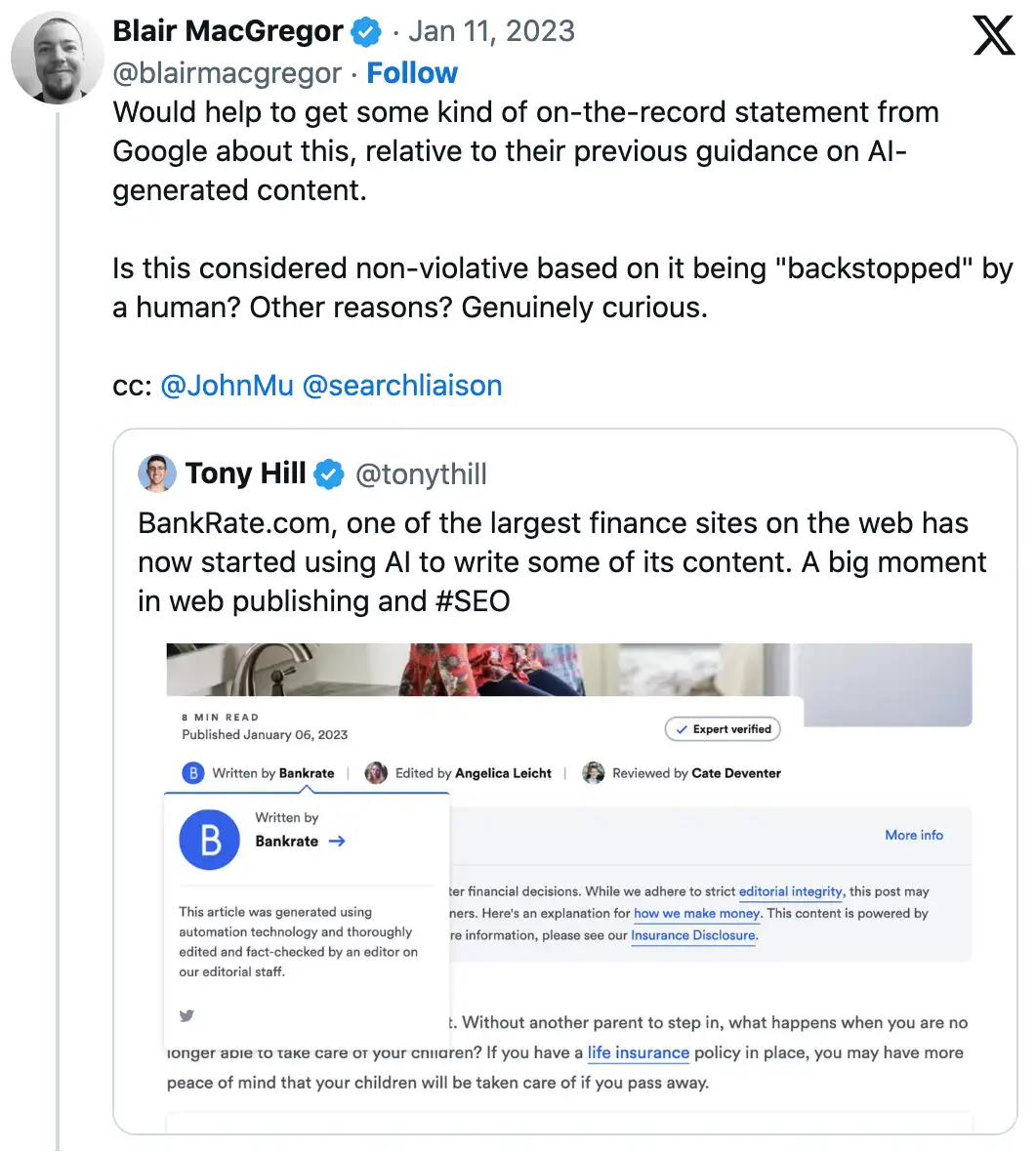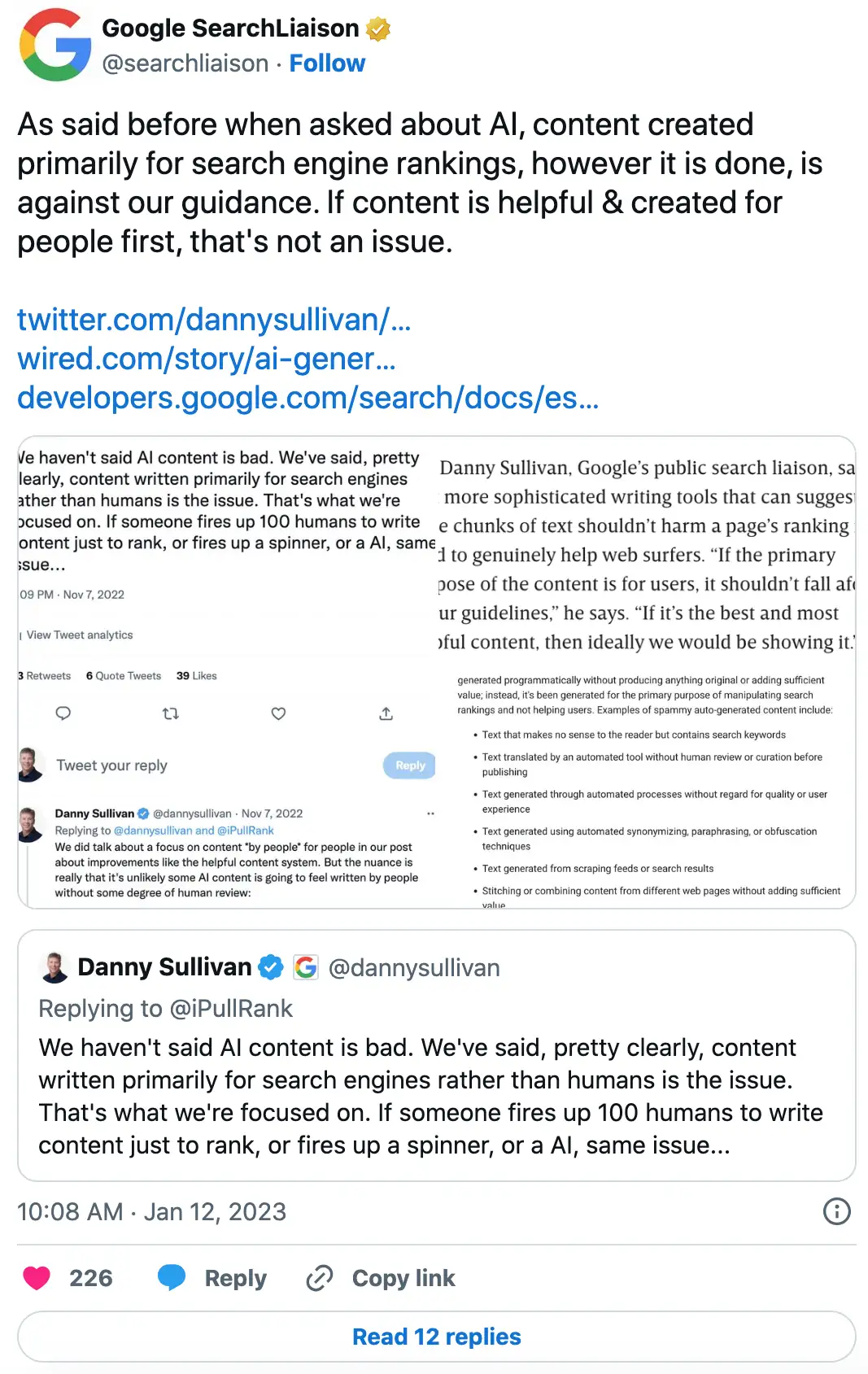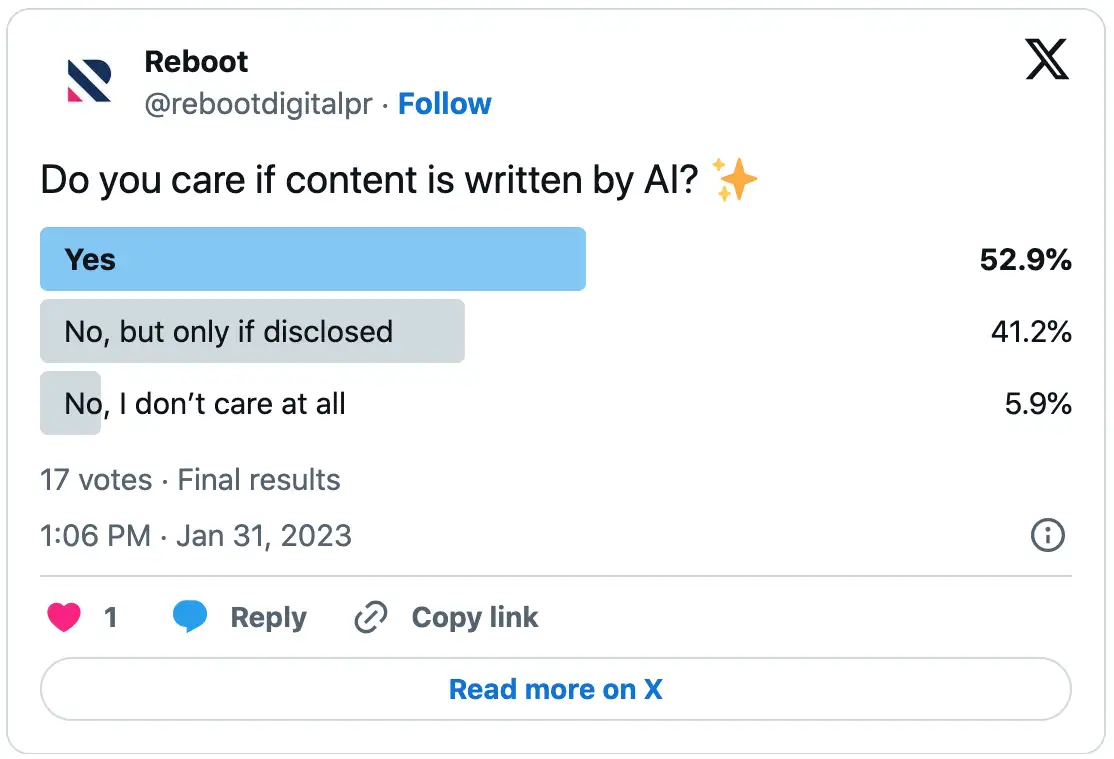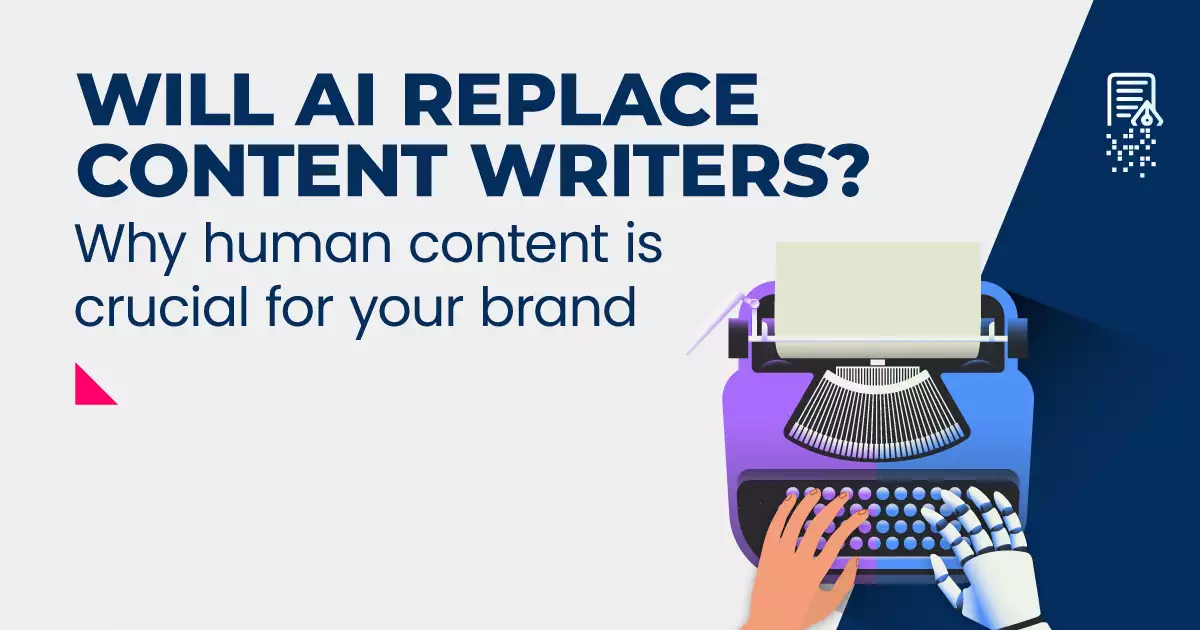

Will AI Replace Content Writers? Why Human Content is Crucial for Your Brand
With the buzz surrounding AI's potential to replace human content writers, many brands will find themselves at the crossroads of innovation and creativity, pondering the future of content creation. Will they stick with traditional content writers or opt for the cost (and time) effective method of AI-generated content?
Through this blog, we will uncover the essence of why, amidst the AI revolution, human-crafted content remains the beating heart of your brand's success, looking to answer the question: will AI replace content writers?
AI in Content Marketing: The Current Landscape
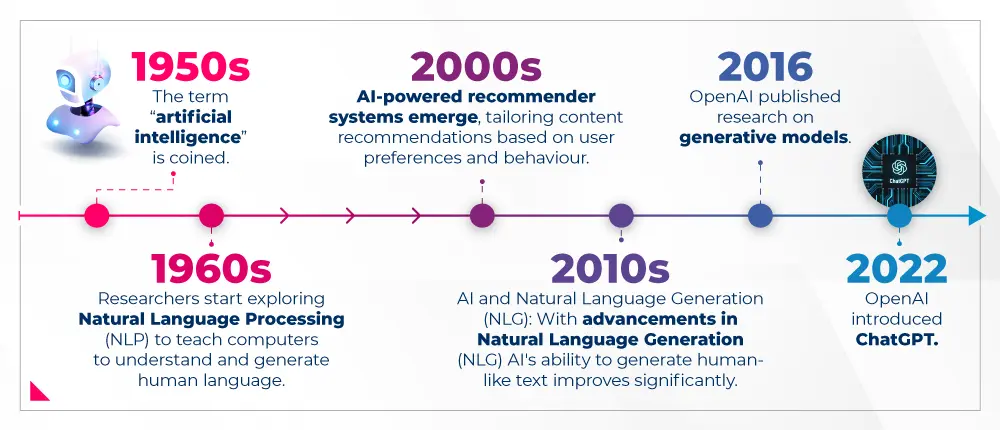
AI has been around for longer than a lot of people realise. The term ‘artificial intelligence’ was first coined in 1956 by John McCarthy, which referred to the “construction of computer programs that engage in tasks that are currently more satisfactorily performed by human beings because they require high-level mental processes such as: perceptual learning, memory organisation and critical reasoning”.
But AI tools were only really fully in the public eye in 2022, when OpenAI opened ChatGPT and DALL.E 2 to the public. From this, we’ve seen a mammoth increase in individuals, and brands, utilising the software.
Understanding AI-Generated Content
As the world of content creation undergoes a fundamental change, AI-generated content has emerged as a prominent player in the game. Whether your brand is ready for it or not, AI tools are here to stay and it’s important to get up to speed with them to avoid falling behind your competitors.
Definition and Types of AI-Generated Content
What is AI-generated content? Well, let’s ask the AI itself:
AI-generated content refers to any text, images, videos, or other forms of creative material that are produced with the assistance or complete automation of artificial intelligence (AI) technologies. These systems use machine learning algorithms, such as language models or image generators, to mimic human-like creativity and generate content without direct human intervention.

These AI-driven tools can generate a wide array of content, including blogs, social media posts, long-form articles, product descriptions, email marketing copy, and more. Take whatever types of copy a content writer can produce and you can bet there’s an AI tool out there that will be able to churn out the same.
Sounds great, right?
However, you can’t expect the same warmth, research, and personality to shine through content that has been created using a machine as you would expect from a skilled content writer. That’s why you need to think twice before steering your brand towards totally AI-generated content.
Pros and Cons of AI Content Creation
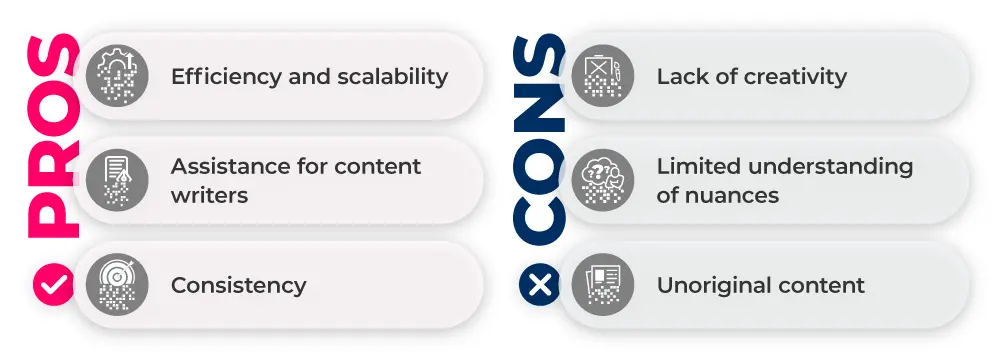
As you can imagine, AI-generated content comes with advantages and drawbacks. Let's explore them further:
Pros:
1. Efficiency and scalability. Probably the biggest pro of AI-generated content for most people is the speed at which it can work. Take a simple blog post, for example, AI tools can create 1,000 words in under two minutes — something that could take human writers over two hours to produce.
2. Assistance for content writers. AI doesn’t have to be used to write an entire piece of content, it can instead be used as a tool to assist content specialists. Depending on the prompts used, different tools can supply them with suggestions, research material, or even generating initial drafts that can be refined and improved by human creativity and judgement.
3. Consistency. AI-generated content maintains a consistent tone and style, something you may struggle to do if using more than one content writer to produce copy for your brand. Although, this consistency could also be a con, see below.
Cons:
1. Lack of creativity and originality. While AI-generated content is quick and consistent, it often struggles to infuse creativity, emotion, and a tone of voice that only human writers can deliver. Your branding is everything, and it can be difficult for AI tools to replicate.
2. Limited understanding of nuances. AI may misinterpret complex subjects, especially topics where emotions and social understanding are important. This can lead to inappropriate content creation that, without content editing, could alienate your audience.
3. Potential for unoriginal content. Where do AI tools get the information from? Content that is already on the web. It scrapes countless articles, blog posts, landing pages, social media posts and others to produce the content you have asked for. And while this may not necessarily result in outright plagiarised content, it does draw heavily from existing sources.
AI Content and Google
As the primary gateway to the vast expanse of the Internet, Google plays a pivotal role in content discovery for most users. The question arises: can Google effectively detect AI-generated content?
The short answer is yes, to a certain extent. Over the years, Google has developed sophisticated algorithms and technologies to detect and assess various forms of content, including AI-generated text. However, as AI technology evolves and becomes more adept at mimicking human writing styles, Google faces a continuous challenge in fine-tuning its detection methods.
But, does Google care?
As long as AI-generated content is reviewed and offers a better user experience, Google is not opposed to it. However, according to their spam policies, the Google web spam team will inevitably penalise low-quality content created using AI tools without fact-checking and editing by humans — just as it penalises low-quality content written by humans.
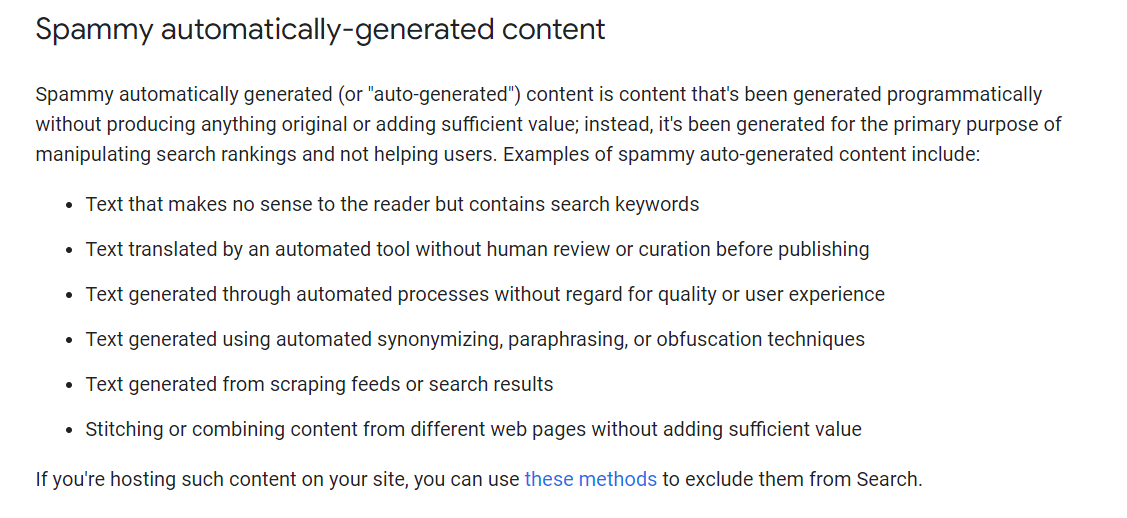
The key here is “generated for the primary purpose of manipulating search rankings and not helping users” when it comes to AI content. If you’re creating a piece for the sole intention of getting it ranking and it doesn’t offer anything useful to the reader then it goes against Google’s guidelines.
With this guidance, it seems as long as the AI content is written well and offers something genuinely helpful to the user then Google — and presumably other search engines — won’t have a problem with it.
The Helpful Content Algorithm Update and Its Impact on AI Content
When Google first brought out the Helpful Content update in August 2022, the general consensus was that it would largely affect sites with AI-generated content…but that isn’t quite what happened.
While sites with spammy, low-quality, and generally all-around bad content did see a drop in their rankings, other sites that also used AI-generated content did not. This goes hand-in-hand with what Google has put out already about any kind of content: as long as it’s helpful and answers the user’s search query, then it doesn’t always matter if it was written by an AI tool.
Is AI-Generated Content Good For SEO?
We know that Google, or other search engines, haven’t explicitly said that they’ll choose human-written content over AI-generated pages to rank.
Yet, an extra ‘E’ for ‘Experience’ has been added to Google’s quality guideline ‘E-A-T’ making it ‘E-E-A-T’.

These quality measures are used to ensure that only the highest-quality content is shown to the user. The ‘E’ for ‘experience’ means Google will prioritise results that exhibit first-hand experience of the topic in question. For example, in eCommerce, blogs written by people that have evidence to show they’ve used the product they’re writing about will rank higher on the search engine results page (SERP) than blogs without this evidence.
On the topic of E-E-A-T, the element of ‘trust’ is another area in which AI-generated content will struggle. Many people still don’t trust content written by AI, and then credibility of using an AI tool as an author for entire pages is pretty low.
Why Human Content, Expertly Written, is Crucial For Your Brand
Although AI-generated pages are on the rise, the unique value of human-crafted content cannot be overlooked. Conscientiously researched, carefully written, and expertly optimised human content remains an indispensable asset for brands seeking to make genuine connections with their audience.
For now, people still care if the content they’re reading is written by AI, or would at least prefer to be warned that it wasn’t produced by a human.
Why? This could be for a number of reasons:
1. They don’t trust the facts and figures presented.
2. Anybody could use the same tool and produce the same content.
3. They believe it plagiarises content that already exists on the Internet.
4. They don’t feel the same connection with AI content as they do with human-written words.
The Power of Human Emotion and Connection
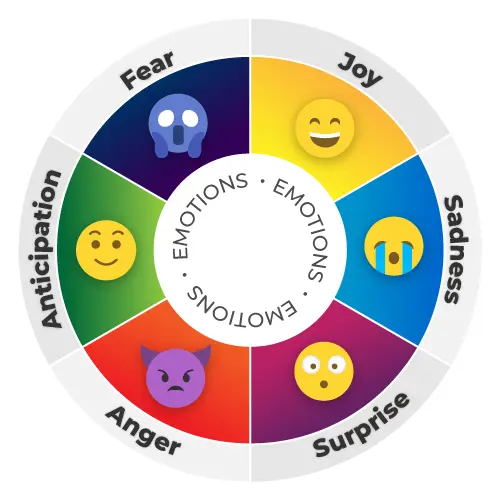
Human-written content carries the distinct voice and personality of the brand. While some AI tools can be trained to mimic a brand’s tone of voice (TOV), the end result is often still some ways away from being written by someone with first-hand experience with the brand.
We don’t just connect with a solid TOV though, we connect through stories.
Human content possesses the innate ability to tap into emotions, evoking empathy and forging deep connections with the audience. This empathy is critical in storytelling as it allows brands to resonate with their customers on a personal level, making them feel understood and valued.
And how can you expect AI-generated content to do this when these tools don’t have any stories of their own? Human content creators not only possess unique experiences, stories and points of view, they also have the ingenuity to think outside the box — enough to captivate readers.
The Google Ranking Experiment: AI vs. Human Content
Although we already know of many benefits of using human content for your brand, as an SEO agency that knows the value of SEO experiments, we really wanted to put it to the test. Using solely AI-generated content may alienate your potential customers, but would it also affect your ability to rank?
So, Reboot conducted an SEO content experiment to see if Google would rank AI-generated content any better or worse than pages created by a human.
The methodology involved selecting an artificial keyword and 10 test domains (without any historic ranking signals associated with them), creating five AI pieces of content and five created by humans — equally optimised for the target keyword— and then monitoring the rankings for each of sites.
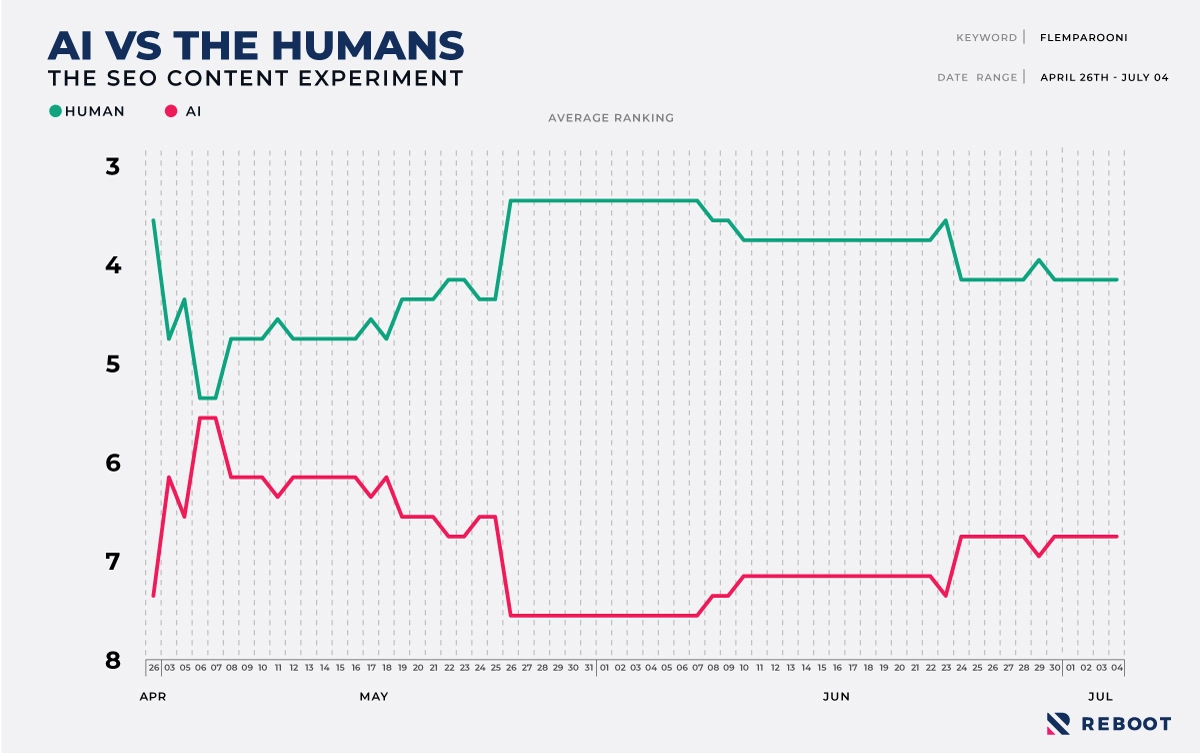
At the end of this experiment, the rank tracking data clearly indicated that human-written content performed better than AI-generated content on the SERPs.
We found that the AI-generated domains had an average ranking of 6.6, whereas the human-written domains had an average ranking of 4.4.
Read more about AI VS HUMANS - THE SEO CONTENT EXPERIMENT and download the full investigation.
How to Use AI in Content Marketing
While we’ve found that human content is important for brand reputation, TOV, customer connection, and even search engine rankings, AI is definitely still here to stay. That’s why it’s important to learn how to use it as a tool to assist content writers. This — paired with knowing how to write good content, and having the skills to produce user-friendly content — will mean your content writers save time and brain space while still creating high-quality pages.
How Content Writers Can Use AI
Brainstorming
AI tools can be a great help when you’ve been tasked to come up with new topics to write about. Start by providing your AI tool with some information about the niche you want to brainstorm ideas for. You can also specify the type of content you want to create, such as blog posts, articles, or social media posts, at this time.
Make sure to ask open-ended questions to explore various angles. For example, you can ask, "What are some current trends in [your industry/niche]?" or "What can I write about in [your industry/niche]?".
Creating an outline
If you’ve been given a topic, or title, then you can use AI to help come up with an outline to assist with your planning.
Start by inputting:
- The type of content you want to create (is it a blog, social media post, landing page?)
- The title and description
- The purpose
- Any keywords you’re targeting
- Anything you need to cover
You should be met by an outline that includes headings, and what each section could cover. It’s then up to you to make sure everything flows naturally, you have the space to cover everything you need to, and the headings are optimised for your target keywords.
Improving readability
Once you’re deep into a new piece of content, it can be difficult to identify all of the places where the readability isn’t quite where it should be.
Some ways you can ask AI tools to improve readability:
- Ask to identify complex sentence structures, wordy phrases, and passive voice.
- Ask for synonyms, alternative phrases, and vocabulary suggestions.
- Ask to analyse the flow of sentences and paragraphs and offer recommendations for smoother transitions.
- Ask to identify complicated concepts or jargon and suggest simpler explanations.
- Ask to spot repetitive phrases or information.
Overcoming writer’s block
Content writing isn’t easy. It’s your job to be creative and when it seems like you have no ideas left, it can be the hardest thing in the world to get writing.
If you’re looking to cure writer’s block in content marketing, then using AI isn’t the worst idea. AI can offer tailored writing exercises and prompts to help get into the creative mindset. You can ask for exercises to spark your imagination, get thinking about the industry you need to write about, or help to transition between writing for different audiences.
You can also ask AI tools to suggest ways to expand on your ideas, as well as adding more depth and detail if you have any partially written pages.
Why Content Writers Are Needed For AI Content Moderation
With content being the foundation of all marketing strategies, ensuring the quality and ethics of online content is vital. This is even more important when using AI-generated content — if it’s not thoroughly checked then you could be sending out messages your brand does not want to be known for.
What to Look For When Moderating AI Content
Contextual understanding
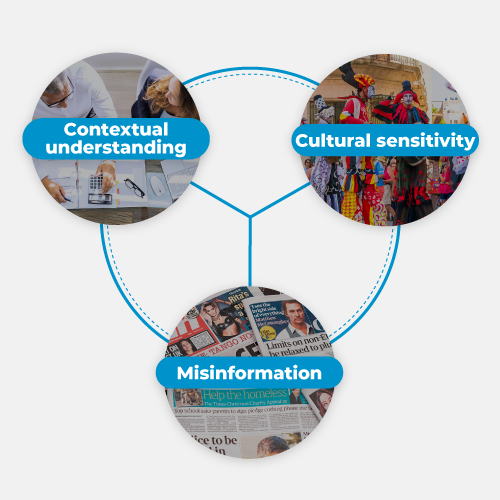
AI tools may struggle to grasp the nuances of language. For example, AI may not be able to understand sarcasm or humour in the source material, leading to misinterpretation and false positives or negatives.
Cultural sensitivity
The cultural diversity of online content poses a challenge for AI, as it may not be equipped to adequately address the cultural context of certain content. It’s also important to exhibit voices from different backgrounds, diversities, and experiences — something you can only get from humans.
Misinformation
Not everything on the Internet is factual. We know this isn’t groundbreaking information to many, but if you’re trusting an AI tool to generate content that needs specific information or stats, then you’re going to have to do a lot of fact-checking.
Should Content Writers Be Worried?
No.
At least the good ones shouldn’t.
Human content, with its emotional appeal, creativity, and expertise, forges authentic bonds that AI-generated content may struggle to replicate. The power of storytelling and the ability to address complex topics make human content an invaluable asset for brand success.
For anyone familiar with Charlie and the Chocolate Factory, the worst that can happen to content writers could be what Mr Bucket goes through: laid off from his job in favour of a machine only to get a new job fixing the very machine that replaced him.
Let an expert content marketing agency show you just how crucial human content is for your brand. Get in touch with Reboot today.
